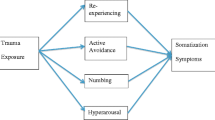Abstract
The responses of 60 households subjected to varying degrees of traumatic events were examined. Specific attention was given to the differential effect that traumatic events have on spouses, especially in terms of general anxiety, state anxiety, trait anxiety, depression, and other symptoms related to trauma. The findings showed that degree of traumatization was proportional to number and intensity of stress related symptoms. Mothers, however, manifested depression and anxiety levels twice as high as fathers. The validity of these results was discussed in terms of cultural beliefs and practices.
Similar content being viewed by others
References
Al-Haq (1988).Punishing a nation. Law in the Services of Man (Al-Haq), Ramallah, West Bank.
Allodi, F., & Stiasny, S. (1990). Women as torture victims.Canadian Journal of Psychiatry, 35 144–148.
Anderson, C. R. (1977). Locus of control, coping behaviors performance in a stress setting: A longitudinal study.Journal of Applied Psychology, 62 446–451.
Baker, A. M. (1992). Gender, urban-rural-camp, and regional differences among self-esteem scores of Palestinian children.The Journal of Psychology, 126 207–209.
Baker, A. M. (1991). The psychological response of Palestinian children to environmental stress associated with military occupation.Journal of Refugee Studies, 4 237–247.
Baker, A. M. (1990). The psychological impact of the intifada on Palestinian children in the occupied West Bank and Gaza: An exploratory study.American Journal of Orthopsychiatry, 60 497–505.
Carlin, J. (1990). Population at risk—women, children, and the elderly. In W. H. Holtzman & T. H. Bornemann (Eds.),Mental health of immigrants and refugees. Austin, Texas: Hogg Foundation for Mental Health Publications.
El-Islam, M. (1982). Overview: Arabic cultural psychiatry.Transcultural Psychiatric Research Review, 19 5–24.
Flannery, R. (1990). Social support and psychological trauma: A methodological review.Journal of Traumatic Stress, 3 593–611.
Ghareeb, A. (1987).Anxiety scale (A). Cairo, Egypt: Dar Al-Nahda Al-Misrieh Publishers (in Arabic).
Gleser, G., Green, B., & Winget, C. (1981).Prolonged psychosocial effects of disaster. New York: Academic Press.
Gotlieb, B. (1985).Women and children as victims of war. Center for Women Policy Studies, Washington, D.C.
Janis, I. L. (1977). Adaptive personality changes. In Monet and R. S. Lazarus (Eds.).Stress and coping: Anthology. New York: Columbia University Press.
Khalek, A. (1984).State and trait anxiety inventory. Alexandria, Egypt: Dar Al-Ma'rifah Al-Jami'eh (in Arabic).
Khamis, V. (1993). Post-traumatic stress disorder among the injured of the intifada.Journal of Traumatic Stress, 6 555–559.
Kleinman, A. (1977). Depression, somatization and the “new cross-cultural psychiatry.”Social Science and Medicine, 11 3–10.
Lazarus, R. S. (1966).Psychological stress and coping process. New York: McGraw-Hill.
Lefcourt, H. M., Miller, R. S., & Sherk, D. (1981). Locus of control as a modifier of the relationship between stressors and moods.Journal of Personality and Social Psychology, 41 357–369.
Norris, F. H. (1992). Epidemiology of trauma: Frequency and impact of different potentially traumatic events on different demographic groups.Journal of Consulting and Clinical Psychology, 60 409–418.
Punamaki, R. L. (1990). The relationship between political violence and psychological response among Palestinian women.Journal of Peace Research, 27 75–85.
Punamaki, R. L. (1987). Psychological stress responses of Palestinian mothers and their children in conditions of military occupation and political violence.The Quarterly Newsletter of the Laboratory of Comparative Human Cognition 9(2 76–84.
Rosenfield, S. (1989). The effects of women's employment, personal control, and sex differences in mental health.Journal of Health and Social Behavior, 30 77–91.
Scheffe, H. (1953). A method for judging all contrasts in the analysis of variance.Biometrika, 40 87–104.
Willis, T. A., & Langner, T. S. (1981). Socioeconomic status and stress. In I. L. Ketash & L. B. Schlesinger (Eds.),Handbook of stress and anxiety. San Francisco: Jossey and Bass.
Author information
Authors and Affiliations
About this article
Cite this article
Baker, A.M., Kevorkian, N.S. Differential effects of trauma on spouses of traumatized households. J Trauma Stress 8, 61–74 (1995). https://doi.org/10.1007/BF02105407
Issue Date:
DOI: https://doi.org/10.1007/BF02105407




